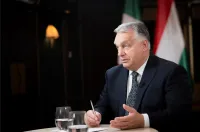Trump and Xi: Ukraine war unlikely to top Seoul meeting agenda
global.espreso.tv
Wed, 29 Oct 2025 14:54:00 +0200

President Trump has already stated that China will help put pressure on Russia regarding peace talks.How exactly could China do this?1. When imposing sanctions on Rosneft and Lukoil, Donald Trump noted that he expects them to be lifted as soon as Russia agrees to a ceasefire. Later, commenting on Putin's statement that sanctions against oil giants would not affect Russia in any way, Trump replied briefly: “We'll see in six months.”In other words, six months is the minimum period that the U.S. considers the war to continue. Of course, surprises are theoretically possible — such as the meeting in Alaska, which no one could have guessed would take place a few days before it happened. But the basic scenario remains the same.2. When talking about possible factors that could influence the war, China is most often mentioned.China is one of the few countries that actually benefits from the war. Russia's isolation has made it extremely dependent on China — which is very timely, given the overproduction crisis that has been going on there for several years. In addition, Beijing receives Russian energy resources at reduced prices and also earns money from the export of dual-use products — both to Russia and Ukraine. In fact, both armies are fighting using Chinese technology and components.Read also: China and ending Russian-Ukrainian warTheoretically, China could influence Russia if it stopped supplying dual-use goods, halted imports of Russian oil, and restricted Moscow's access to the yuan's financial infrastructure, which enables international payments. But to do so, China would need something equivalent to what it is currently gaining from the war.3. Only strong global economies can influence China's position on cooperation with Moscow. First and foremost, the G7 countries, which are able to offer compensation for economic and political losses.This refers to potential concessions to Beijing: lifting technological sanctions, removing restrictions on car exports to the UюSю and the EU, and reducing tariff pressure. There is also a block of political sanctions related to human rights — Uyghurs or Taiwan.But since Washington and Brussels do not have a unified position on these issues, China sees no point in taking steps that are not in its interests. When the U.S. or the EU call on China to stop cooperating with Russia, they appeal mainly to humanitarian arguments: “it will help stop the war and save lives.” In response, China issues press releases stating that it too is “for peace and international law.”Beijing even prepared a “12-point Chinese peace plan” and then a “joint Chinese-Brazilian peace plan.” In other words, it is doing the same thing as the EU: saying the right words but not taking concrete action.4. The meeting between the U.S. and China leaders could potentially be the start of negotiations on Chinese pressure on Russia. But this is only possible in one case: if the parties move away from the policy of confrontation and agree at least on the general principles of warming relations.In other words, the issue of the war against Ukraine is unlikely to even be among the top ten topics to be discussed in Seoul. However, although the probability is low, it is not zero.Today, the U.S. has intensified its search for ways to end the war. What seemed unrealistic not long ago (such as sanctions against Rosneft) is already being implemented. Other ideas — such as discussions about long-range missiles — are at least being seriously discussed.Therefore, the chance that Washington and Beijing will find a formula for agreements on a more active role for China in the peace process in Ukraine, although small, is certainly greater than ever before.SourceAbout the author. Mykola Knyazhytskyi, journalist, member of the Ukrainian parliamentThe editorial team does not always share the opinions expressed by the authors of blogs or columns.








